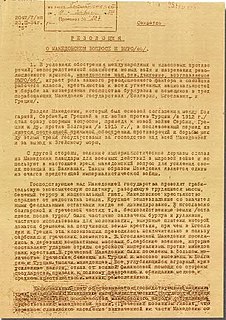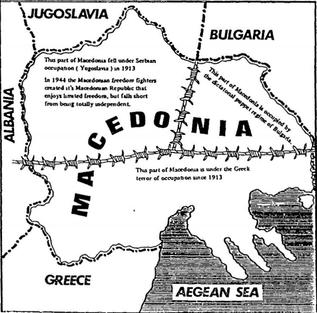 W
WMacedonian nationalism is a general grouping of nationalist ideas and concepts among ethnic Macedonians that were first formed in the late 19th century among separatists seeking the autonomy of the region of Macedonia from the Ottoman Empire. The idea evolved during the early 20th century alongside the first expressions of ethnic nationalism among the Slavs of Macedonia. The separate Macedonian nation gained recognition after World War II when the "Socialist Republic of Macedonia" was created as part of Yugoslavia. Afterwards the Macedonian historiography has established historical links between the ethnic Macedonians and events and Bulgarian figures from the Middle Ages up to the 20th century. Following the independence of the Republic of Macedonia in the late 20th century, issues of Macedonian national identity have become contested by the country's neighbours, as some adherents to aggressive Macedonian nationalism, called Macedonism, hold more extreme beliefs such as an unbroken continuity between ancient Macedonians, and modern ethnic Macedonians, and views connected to the irredentist concept of a United Macedonia, which involves territorial claims on a large portion of Greece, along with smaller regions of Albania, Bulgaria, Kosovo and Serbia.
 W
WAegean Macedonia is a term describing the modern Greek region of Macedonia in Northern Greece. It is currently mainly used in the Republic of North Macedonia, including in the irredentist context of a United Macedonia. The term is also used in Bulgaria as the more common synonym for Greek Macedonia, without the connotations it has in the Republic of North Macedonia. The term has no circulation in Greece, since Aegean usually refers to the Greek islands or to strictly Greek coastal areas with direct access to the Aegean Sea. Although Greek Macedonia does indeed have its coastline along the northern Aegean, the province is more than anything else dominated by its high mountain ranges and broad, grassy plains, rather than by its coastline.
 W
WAntiquization, sometimes also ancient Macedonism, is a term used mainly to critically describe the identity policies conducted by the nationalist VMRO-DPMNE-led governments of North Macedonia in the period between 2006 and 2017. In the contemporary Macedonian discourse, antiquization refers to the identitarian policies based on the assumption that there is a direct link between today's ethnic Macedonians and Ancient Macedonians. The recent politics of history therefore not only embrace the recollection of the alleged ancient heritage of the Ancient Macedonians, i.e. the heritage of Philip II and his son Alexander the Great, but also seek to depict a coherent continuity of history from the ancient Kingdom of Macedon until the modern Republic of North Macedonia in order to reveal the uniqueness of the modern Macedonians and their country. This continuous and supposedly linear historiography includes the assertion that the modern ethnic Macedonians are direct descendants of the Ancient Macedonians. The expression “antiquization” originates from the history of arts and describes "the Renaissance practice of giving a city the appearance of ancient Rome or Athens through the introduction of structures organized in the classical mode". While critics use the term "antiquization" in order to reveal "a state-framed set of actions such as direct interventions in the public space and in the public sphere of society in general", proponents of the government's politics regard the term "antiquization" as an invention and neologism that is used as a part of anti-Macedonian propaganda.
 W
WHistoriography in North Macedonia is the methodology of historical studies used by the historians of that country. It has been developed since 1945 when SR Macedonia became part of Yugoslavia. According to Stefan Troebst it has preserved nearly the same agenda as the Marxist historiography from the times of the Socialist Federal Republic of Yugoslavia. The generation of Macedonian historians closely associated with the Yugoslav period who worked on the actual national myths of that time are still in charge of the institutions. In fact, in the field of historiography, Yugoslav communism and Macedonian nationalism are closely related. According to Ulf Brunnbauer, modern Macedonian historiography is highly politicized, because the Macedonian nation-building process is still in development. Diverging approaches are discouraged and people who express alternative views risk economic limitations, failure of academic career and stigmatization as "national traitors". Troebst wrote already in 1983 that historical research in the SR Macedonia was not a humanist, civilizing end in itself, but was about direct political action. No such case of reciprocal dependence of historiography and politics has been observed in modern Europe. Although ethnic Macedonians do not appear in primary sources before 1870, medieval history is extremely important for the traditions of modern Macedonian nationalism. Macedonian historians fabricated after 1960 the myth that Samuel of Bulgaria was Macedonian by nationality. Moreover, after 2010 a nation-building project was promoted to impose the deceptive idea that the Macedonian nation was the oldest on the Balkans, with an unbroken continuity from Antiquity to Modern times. Some domestic and foreign scholars have criticized this agenda of a denialist historiography, whose goal is to affirm the continuous existence of a separate Macedonian nation throughout history. This controversial worldview is ahistorical, as it projects modern ethnic distinctions into the past. Such an enhanced, ethnocentric reading of history contributes to the distortion of the Macedonian national identity and degrades history as an academic discipline. Under such historiographies generations of students were educated in pseudo-history.
 W
WThe history of Macedonians has been shaped by population shifts and political developments in the southern Balkans, especially within the region of Macedonia. The ideas of separate Macedonian identity grew in significance after the First World War, both in Vardar and among the left-leaning diaspora in Bulgaria, and were endorsed by the Comintern. During the Second World War these ideas were supported by the Communist Partisans, but the decisive point in the ethnogenesis of this South Slavic people was the creation of the Socialist Republic of Macedonia after the World War II, as a new state in the framework of the Socialist Federal Republic of Yugoslavia.
 W
WIndependent Macedonia was a conceptual project of the Internal Macedonian Revolutionary Organization (IMRO) to create an independent Macedonia, during the interwar period.
 W
WInternal Macedonian Revolutionary Organization – Democratic Party for Macedonian National Unity, simplified as VMRO-DPMNE is a political party in North Macedonia and one of the two major parties in the country, the other being the Social Democratic Union of Macedonia.
 W
WThe Macedonian Society or Secret Macedonian Society was secret organization established in 1885 by Macedonian Slavs in Sofia, Bulgaria, to promote a kind of Macedonian identity, distinguished especially from the ethnic identity of the Bulgarians, the establishment of the Archbishopric of Ohrid separate from the Bulgarian Exarchate and the promotion of the Macedonian language. Its leaders were Naum Evrov, Kosta Grupčev, Vasilij Karajovev and Temko Popov.
 W
WThe resolution of the Comintern of January 11, 1934, was an official political document, in which for the first time, an authoritative international organization has recognized the existence of a separate Macedonian nation and Macedonian language.
 W
WSkopje 2014 was a project financed by the Macedonian government of the then-ruling nationalist party VMRO-DPMNE, with the official purpose of giving the capital Skopje a more classical appeal. The project, officially announced in 2010, consisted mainly of the construction of colleges, museums and government buildings, as well as the erection of monuments depicting historical figures from the region of Macedonia. Around 20 buildings and over 40 monuments were to be constructed as part of the project.
 W
WUnited Macedonia, or Greater Macedonia, is an irredentist concept among ethnic Macedonian nationalists that aims to unify the transnational region of Macedonia in Southeastern Europe into a single state that would be dominated by ethnic Macedonians. The proposed capital of such a United Macedonia is the city of Thessaloniki, the capital of Greek Macedonia, which ethnic Macedonians and the Yugoslav leader Josip Broz Tito had planned to incorporate into their own states.